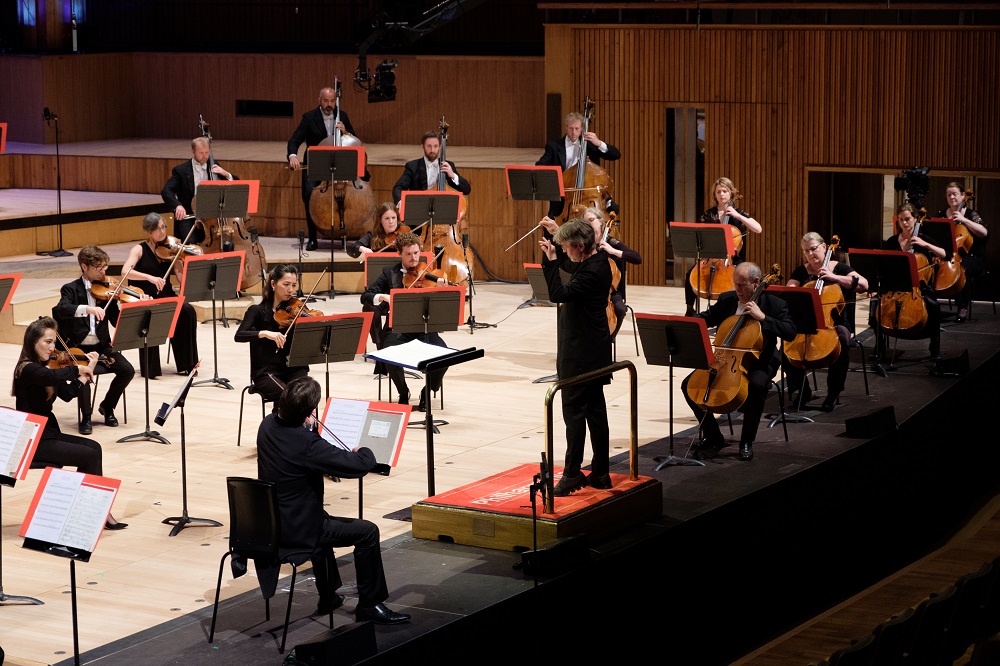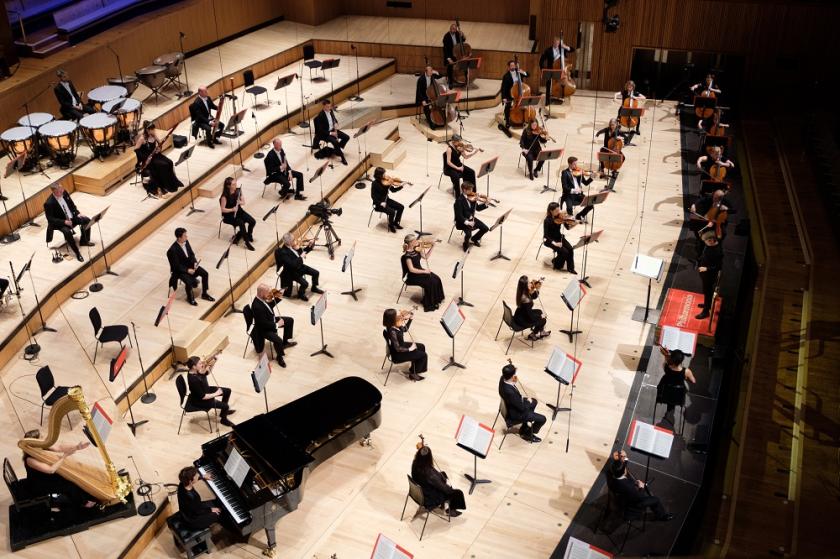In the beginning, 38 years ago, came a career-making Mahler Third Symphony for Esa-Pekka Salonen in his first concert with the Philharmonia. Reassembling that vast epic wouldn't be possible under present circumstances. Last night, ending 13 years as the orchestra’s music director, Salonen returned to the purest source, Bach, cannily but also movingly referencing two of his predecessors in the post, Klemperer and Sinopoli, in two arrangements, and ended where the first of these farewell concerts started, with Beethoven in C major, homaging another early partnership, with the wonderful Mitsuko Uchida.
Collegial Salonen certainly was, shedding spotlights not only on Uchida but also on so many of the Philharmonia’s superlative principals – there’s nowhere to hide in the Bach arrangements by Webern and Berio, for instance. Yet he also, and justifiably, featured himself as composer in the iridescent centre of the concert. This, too, started with a spotlight on a key orchestral member, the night’s leader – not Zsolt-Tihamér Visontay who played in last week’s concert but what the Philharmonia calls his “co-concert master”, young Benjamin Marquise Gilmore, delivering the celebrated Prelude from Bach’s Partita in E from the ethereal perspective of the royal box, but with plenty of muscle and energy. This, Salonen told us in a long but eloquent introduction to the concert, was the first piece he and Frank Gehry heard in Los Angeles’ Walt Disney Hall, then under construction, and the original version of his fantasia around it, Fog, homages not only the prelude but also the architect on his 90th birthday, with harmonies based on a musical version of part of Gehry’s name - F A G E H (B natural in English).
We heard the premiere of a fuller orchestral version, in the familiar kaleidoscope which has always been a trademark of Salonen the composer, but has grown ever richer through his association with the Los Angeles Philharmonic. You might have detected chords and colours from the big John Adams orchestral scores, but the beauty of it was that despite the expansion, there were no trumpets or trombones even though you thought you heard them. As I could have sworn I did in what sounded like lower-brass cushioning at some especially rich points, but it was an aural illusion. Not an obviously shapely work, but the colour, tempo and rhythm shifts were enough to keep us engaged for the perfect duration.  I’m glad, in the absence of a printed programme, that we had details from Salonen the speaker on his choice of Bach transcriptions. Klemperer’s very beautiful string arrangement of “Bist du bei mir” – the melody of which we now know is not originally by Bach, but its creator has been forgotten – was something that grabbed Salonen immediately when he heard it on his car radio. With especially lovely spotlight on principal cellist Timothy Walden, the performance was a perfect balance of the romantic and the austere (pictured above), setting up the sparer pointillist technique of Webern in the six-voice Second Ricercata, the richest fugal setting in The Musical Offering composed on a seemingly impossible theme by Frederick the Great of Prussia.
I’m glad, in the absence of a printed programme, that we had details from Salonen the speaker on his choice of Bach transcriptions. Klemperer’s very beautiful string arrangement of “Bist du bei mir” – the melody of which we now know is not originally by Bach, but its creator has been forgotten – was something that grabbed Salonen immediately when he heard it on his car radio. With especially lovely spotlight on principal cellist Timothy Walden, the performance was a perfect balance of the romantic and the austere (pictured above), setting up the sparer pointillist technique of Webern in the six-voice Second Ricercata, the richest fugal setting in The Musical Offering composed on a seemingly impossible theme by Frederick the Great of Prussia.
Berio’s setting of Contrapunctus XIX from The Art of Fugue with its mysterious held chords taking over from the unfinished work presumes that Bach flew off into the ether at the end of it – a chronological impossibility, but a fitting homage to the untimely death of Salonen’s predecessor Giuseppe Sinopoli. Berio’s refinement is equal to Webern’s, and never more exquisite than when the two violas introduced the second fugal theme.  We came down to earth at first with Mitsuko Uchida’s finely profiled role in the Beethoven concerto (the pianist pictured above with Salonen at the end of the concert); the first movement was fine, but not revelatory as I found it when Krystian Zimerman played the work as part of a concertos cycle with Simon Rattle and the London Symphony Orchestra last December, partly because Zimerman’s palette is richer, the collaboration with orchestra and conductor more visible. But magic happened in the pianissimos of the Largo, embracing pure poetry in the passage at the heart of the movement with ineffable solos from flautist Charlotte Ashton and bassoonist Emily Hultmark, and time stood still in the coda. Never have I heard an audience more intensely silent – proof indeed that when we actively partipate as listeners, we play a part that’s been sorely missing over the past year.
We came down to earth at first with Mitsuko Uchida’s finely profiled role in the Beethoven concerto (the pianist pictured above with Salonen at the end of the concert); the first movement was fine, but not revelatory as I found it when Krystian Zimerman played the work as part of a concertos cycle with Simon Rattle and the London Symphony Orchestra last December, partly because Zimerman’s palette is richer, the collaboration with orchestra and conductor more visible. But magic happened in the pianissimos of the Largo, embracing pure poetry in the passage at the heart of the movement with ineffable solos from flautist Charlotte Ashton and bassoonist Emily Hultmark, and time stood still in the coda. Never have I heard an audience more intensely silent – proof indeed that when we actively partipate as listeners, we play a part that’s been sorely missing over the past year.
Uchida’s humour in the finale is earthy rather than aerial, but none the worse for that, and again co-ordination with the players was razor-sharp. I imagined that the work’s position in the concert, and the nature of the event, precluded an encore. Not so, but Uchida kept it very short indeed with the the second of Schoenberg's Sechs Kleine Klavierstücke - another play against silence which Salonen must have wryly enjoyed.
- Due to be streamed on 25 June. Buy tickets here
- More classical music reviews on theartsdesk














Add comment